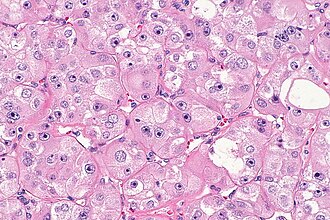Eosinophilic vacuolated tumour
Revision as of 21:52, 13 November 2021 by Michael (talk | contribs) (Michael moved page High-grade oncocytic renal tumour to Eosinophilic vacuolated tumour: entity renamed)
| Eosinophilic vacuolated tumour | |
|---|---|
| Diagnosis in short | |
 Micrograph of a high-grade oncocytic tumour of the kidney. H&E stain. | |
|
| |
| LM |
abundant oncocytic cytoplasm with prominent intracytoplasmic vacuoles, round nuclei, prominent nucleoli (ISUP nucleolar grade 3), no perinuclear halos |
| LM DDx | renal oncocytoma, renal hybrid oncocytic/chromophobe tumour, chromophobe renal cell carcinoma, other renal tumours with eosinophilic cytoplasm |
| IHC | PAX8 +ve, CD117 +ve, CD10 +ve, SDHB +ve, TFE3 -ve |
| Site | kidney - see kidney tumours |
|
| |
| Syndromes | tuberous sclerosis |
|
| |
| Prevalence | very rare? (evolving entity) |
| Prognosis | unknown (evolving entity) |
| Clin. DDx | other renal tumours |
| Treatment | excision |
High-grade oncocytic renal tumour, abbreviated HOT, is a kidney tumour type currently not recognized by the WHO classification as per the 2016 Blue Book.
General
- Previously lumped into renal hybrid oncocytic/chromophobe tumour.
- Evolving entity.
- May be seen within the context of tuberous sclerosis.[1]
Microscopic
Features:[2]
- Abundant oncocytic cytoplasm with prominent intracytoplasmic vacuoles.
- Round nuclei
- No "raisinoid" nuclei typical of chromophobe RCC.
- Prominent nucleoli (ISUP nucleolar grade 3).
- No perinuclear halos.
DDx:
- Renal oncocytoma.
- Renal hybrid oncocytic/chromophobe tumour.
- Chromophobe renal cell carcinoma.
- Other renal tumours with eosinophilic cytoplasm.
Images
IHC
Features:[2]
- PAX8 +ve.
- AE1/AE3 +ve.
- CK18 +ve.
- SDHB +ve.
- CD10 +ve (12 of 13 cases).
- HMB45 -ve.
- Melan A -ve.
- TFE3 -ve.
- CD117 +ve (9 of 14 cases).
See also
References
- ↑ Trpkov, K.; Bonert, M.; Gao, Y.; Kapoor, A.; He, H.; Yilmaz, A.; Gill, AJ.; Williamson, SR. et al. (Apr 2019). "High-grade oncocytic tumour (HOT) of kidney in a patient with tuberous sclerosis complex.". Histopathology. doi:10.1111/his.13876. PMID 31002177.
- ↑ 2.0 2.1 He, H.; Trpkov, K.; Martinek, P.; Isikci, OT.; Maggi-Galuzzi, C.; Alaghehbandan, R.; Gill, AJ.; Tretiakova, M. et al. (Dec 2018). ""High-grade oncocytic renal tumor": morphologic, immunohistochemical, and molecular genetic study of 14 cases.". Virchows Arch 473 (6): 725-738. doi:10.1007/s00428-018-2456-4. PMID 30232607.





